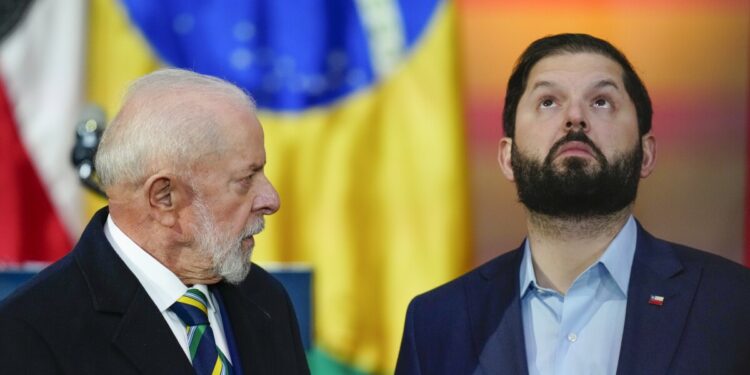Dictatorial Venezuelan President Nicolas Maduro in Caracas in 2018
And he appreciates the realpolitik behind the caution taken toward Maduro by leaders like Lula, who has to be mindful of the ardent left wing of his Workers Party the way President Biden has to engage liberal Democrats like New York Congresswoman Alexandria Ocasio-Cortez.
“Lula has to hold his governing coalition together,” Paarlberg acknowledges.
Still, Paarlberg says the left right now needs to show its solidarity with Venezuelans — not Maduro.
“A more people-centered approach,” Paarlberg insists.
“I think it’s important for progressives to understand that governments are temporary but people are the ones living the consequences. They need to think about who is disempowered here — people who are on the losing end of state violence in this case.”
Championing the disempowered, after all, is supposedly what defines the left’s brand — especially in Latin America, home to the worst socioeconomic inequality of any region in the world.
As Boric also insisted in his remarks last month, Maduro’s actions “are not the left or the left’s ideals.”
And when the left betrays those ideals, it also hurts center-left groups like the Democratic Party here in the U.S., say Democrats like Evelyn Perez-Verdia of Fort Lauderdale, who heads the communications consulting firm We Are Más.
“This has a domino effect at the polls,” Perez-Verdi says. “It fans the flames of what Republicans are currently calling Democrats — socialists, communists.”
Perez-Verdia argues that alienates Hispanic voters.
“I think it’s very clear when you look at how many Hispanic Democrats have left the party in Florida since 2020,” she adds. “It’s been close to 150,000,” from 947,000 registered Hispanics then to closer to 800,000 now.
Florida’s Democratic leadership has condemned Maduro. But it probably also didn’t help the party when someone, presumably from the left, spray-painted a threatening pro-Maduro slogan last month in Miami’s Bayfront Park — where Venezuelan expats had just held a pro-democracy rally.
So far no one has been arrested.
Want more stories about the Americas? Sign up for WLRN’s Americas Report newsletter and we’ll send a round up of the most important news and stories from the hemisphere, every Thursday morning. Sign up here.
Source link : http://www.bing.com/news/apiclick.aspx?ref=FexRss&aid=&tid=66dadd2deda34af9aa1d12d7435c71a7&url=https%3A%2F%2Fwww.wlrn.org%2Famericas%2F2024-09-06%2Fglobal-left-venezuela-response-brazil-chile&c=4491868613372532095&mkt=en-us
Author :
Publish date : 2024-09-05 23:00:00
Copyright for syndicated content belongs to the linked Source.












